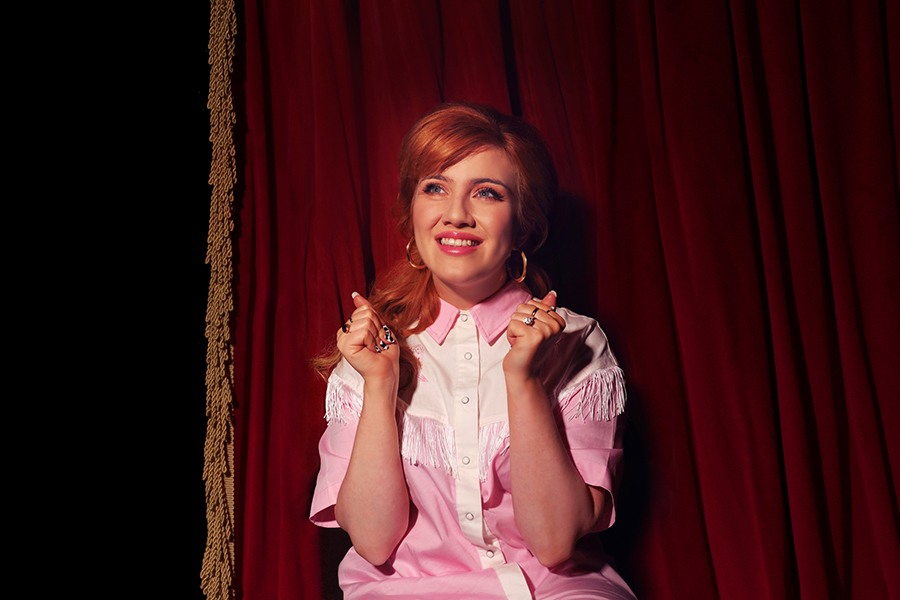Interview: CMAT using Irish country music culture to regrow country roots

CMAT, courtesy Sarah Doyle.
CMAT, short for Ciara Mary-Alice Thompson, is Irish. She was born in Ireland and, for this video call, she was in her mom’s house in Dublin. She also sings country music, a quintessentially American art form. The combination of those two things tends to confuse people.
“Americans and English people are always shocked by the country music stuff, that an Irish person would be into country music as we are,” she said. “But country music is everywhere in Ireland. I’m from north Dublin, and in north Dublin Johnny Cash is god. Johnny Cash was everywhere.”
As she pointed out, country music was created as a fusion of the music of many different cultures that came together in the United States, from West Africa all the way up to Ireland. CMAT spoke of Irish traditional music as one thread in the tapestry.
Possibly because of this, or possibly just because people there like it, country is more popular in Ireland than Americans may expect. Thompson illustrated her point by describing a bit of Dublin’s country music culture.
“There’s a pub in town, Tom Kennedy’s, and I go there to do karaoke. There’s a culture of women in their 60s and 70s and they’re all true-blue inner-city Dubliners that go there every Sunday,” she said. “They wear their wig, they have a full face of makeup on and the full jewelry on, and they literally just sit down together, barely talking, drinking their sherry, and they’re just waiting to go up and sing karaoke. When they get up there they’re really respectful. They might have their own microphone, and they sing country music songs. It’s a really intense karaoke culture where you have to sit there and watch and listen.”
It wouldn’t be completely alien to Americans, either. CMAT said that Dolly Parton—Thompson calls herself a Dolly Parton obsessive—would fit right in with that crowd.
“I do think Dolly Parton is like an Irish aunt, an Irish godmother,” she said. “Everything about her is north Dublin to me. The wig, the makeup, the nails, the loudness, the smallness. The fact that she’s very small and then very loud, I feel, is ripped from a pub in north of Dublin.”
But she does understand why Americans would be confused. Mainstream country music has gone from a melting pot of the music of America’s working class to a rigidly defined, insular genre. And while that may color people’s expectations, Thompson doesn’t believe it defines the entire style of music. It’s less rigidly defined in other parts of the world. The story told in critically acclaimed film “Wild Rose” (about a Glaswegian singer who flees to America to pursue her country music dream) is not a one-off, while Australia has a healthy country music scene in Tamworth, it’s own version of Nashville.
“Modern country music is very insular. It’s not very accepting. It doesn’t have the same roots of what country music is because it comes from a melting pot, from many different ethnicities and cultures and histories and backgrounds,” she said. “It makes zero sense that modern country music is so insular, that one type of person is allowed to sing modern American country music and nobody else is allowed in. And the sound is insular as well! There’s only one type of acceptable kind of country sound in the upper echelons of what makes money in country music. And that doesn’t make sense to me either.”
That’s changing, however, with artists going back to country’s roots.
“There’s an artist, Daniel Romano, a Canadian artist, who makes country music. He’s a genre-switcher, but he has a couple albums of country music and he calls it ‘mosey.’ He basically just said it’s modern country music if everything between 1980 and now never existed,” CMAT said. “So it’s inspired by country music from the ’40s through the ’70s and pretends everything in between didn’t happen, but still trying to modernize it. I feel like I’m kinda trying to do a similar thing.”
As she gestured at her “country music is for everyone” T-shirt, she said she sees a major shift on the horizon. One she finds very welcome and is proud to contribute to.
“I hope that the yeehaw agenda is starting to percolate into the actual south in America,” she said. “It’s something that’s happened in the last three years, where gay people and People of Color have been trying to reclaim cowboy culture. So all my friends who are really into westerns and cowboy stuff, they’re all gay. I think when everyone found out that country and western music historically was the music of the oppressed and it was so completely rewritten, everyone was annoyed and said, ‘We’re just gonna ruin your party. We’re gonna make it gay.'”
Follow editor Daniel J. Willis at Twitter.com/BayAreaData.
